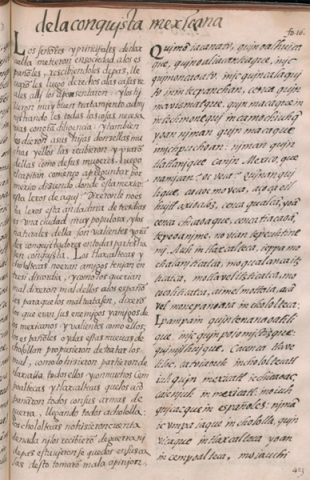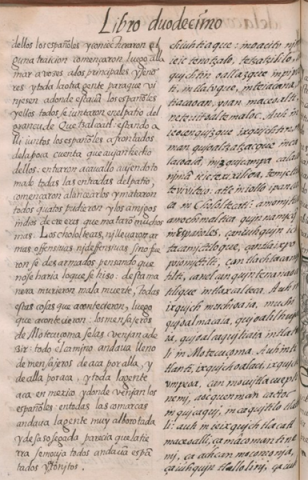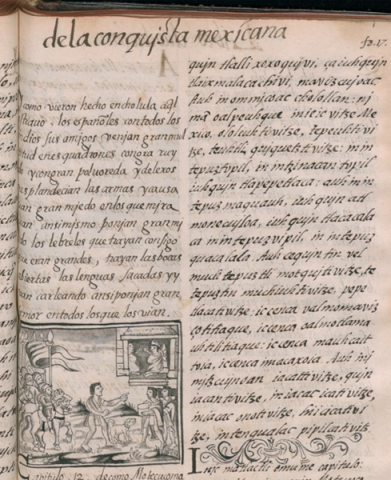 |
[Transcription of the Nahuatl (right-hand column) by James Lockhart:]
[f. 15v., cont.] Inic matlactli oce capitulo: vncā mitoa in quenin Españoles acico in vncā tlaxcalla: in mitoa Texcalla.
|
[Translation of the Nahuatl (right-hand column) by James Lockhart:]
Eleventh chapter, where it is said how the Spaniards reached Tlaxcala, [also] called Texcallan.
[Translation of the Spanish (left-hand column) by James Lockhart:]
Chapter Eleven, of how the Spaniards reached Tlaxcala, then called Texcallan.
|
[Translation of the Nahuatl into Spanish by Fr. Bernardino de Sahagún; transcription of the Spanish (left-hand column) by James Lockhart:]
[f. 15v., cont.] Capitulo .ii. de como los españoles llegaron a tlaxcalla que entoce se llamaua texcalla.
|
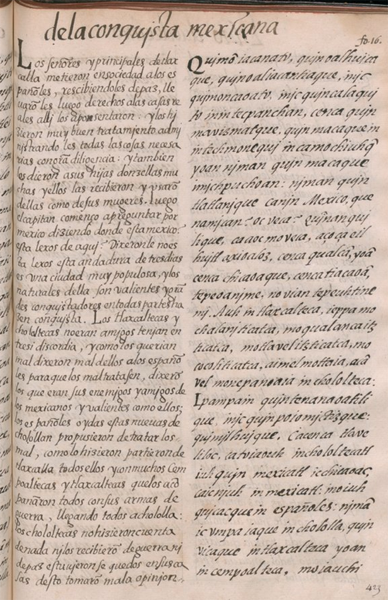 |
[Transcription of the Nahuatl (right-hand column) by James Lockhart:]
[f. 16r.] Quimōiacanato, quinoalhuicaque, quinoaliacantiaque, inic quimoncaoato, inic quincalaquito in intecpanchan, cenca quinmavizmatque, quinmacaque inintech monequi inca mochiuhq¯ yoan niman quinmacaque imichpuchoan:
niman quintlatlanique canin Mexico, quenamican? oc veca?
Quīnanquilique, ca aocmo veca, aço ça eilhuitl axioaloz, cenca qualcā, yoā cenca chicaoaque, cenca tiacaoā, tepeoanime, novian tepeuhtinemi.
Auh in tlaxcalteca, ieppa mochalaniticatca, moqualancaitzticatca, motlavelitzticatca, mococoliticatca, aimel mottaia, acā vel monepanoaia in choloteca: Ipampa inquintenanaoatilique, inic quinpoiomictizque:
quimilhuique. Ca cenca tlaveliloc, ca toiaouh in chololtecatl iuhquin mexicatl ic chicaoac, ca icniuh in mexicatl:
in o iuh quicacque in españoles: nimā ic vmpa iaque in chololla, quinvicaque in tlaxcalteca yoan in cempoalteca, moiauchi
|
[Translation of the Nahuatl (right-hand column) by James Lockhart:]
[The Tlaxcalans] guided, accompanied, and led them until they brought them to their palace<s> and placed them there. They showed them great honors, they gave them what they needed and attended to them, and then they gave them their daughters.
Then [the Spaniards] asked them, “Where is Mexico? What kind of a place is it? Is it still far?”
They answered them, “It’s not far now. Perhaps one can get there in three days. It is a very favored place,and [the Mexica] are very strong, great warriors, conquerors, who go about conquering everywhere.”
Now before this there had been friction between the Tlaxcalans and the Cholulans. They viewed each other with anger, fury, hate, and disgust; they could come together on nothing. Because of this they put [the Spaniards] up to killing them treacherously.
They said to them, “The Cholulans are very evil; they are our enemies. They are as strong as the Mexica,and they are the Mexica’s friends.”
When the Spaniards heard this, they went to Cholula. The Tlaxcalans and Cempoalans went with them, outfitted for war.
[Translation of the Spanish (left-hand column) by James Lockhart:]
The lords and leaders of Tlaxcala introduced the Spaniards into their society, receiving them peacefully, and then they took them straight to the royal palace, where they gave them lodging, and they treated them very well, with great diligence providing them with the necessary things. They also gave them many of their maiden daughters, and they received them and used them as their women.
Then the Captain began to ask about Mexico, saying, "Where is Mexico? Is it far from here?"
They told him, "It's not far; it's a journey of three days. The city is very populous, and its inhabitants are brave and great conquerors; they make conquests everywhere."
The Tlaxcalans and Cholulans were not friends, there was discord between them, and as they wished them ill they said bad things of them to the Spaniards so they would treat them badly. They told them that they were their enemies and friends of the Mexica, and valiant like them. When the Spaniards heard such news of Cholula they decided to treat them badly, as they did.
They all departed from Tlaxcala, with many Cempohualans and Tlaxcalans accompanying them, all with their weapons of war. When they all reached Cholula, the Cholulans took no notice of anything; they received them with neither war nor peace, but stayed in their houses. From this the Spaniards conceived a bad opinion
|
[Translation of the Nahuatl into Spanish by Fr. Bernardino de Sahagún; transcription of the Spanish (left-hand column) by James Lockhart:]
[f. 16r.] Los señores y principales de tlaxcalla metieron en sociedad a los españoles, rescibiendolos de paz, lleuarōles luego derechos a las casas reales alli los aposentaron: y los hizieron muy buen tratamiento administrandoles todas las cosas necesarias con grā diligencia: y tambien les* dieron a sus hijas donzellas muchas y ellos las recibieron y vsarō dellas como de sus mugeres.
Luego el capitan començo a preguntar por mexico diziendo donde esta mexico? esta lexos de aqui?
Dixeronle no esta lexos esta andadura de tres dias es vna ciudad muy populosa, y los naturales della son valientes y grādes conquistadores en todas partes hazen conquista.
Los tlaxcaltecas y chololtecas no eran amigos tenian entre si discordia, y como los querian mal dixeron mal dellos a los españoles para que los maltratesen, dixerōlos que eran sus enemigos y amigos de los mexicanos y valientes como ellos; los españoles oydas estas nueuas de cholollan propusieron de tratarlos mal, como lo hizieron
partieron de tlaxcalla todos ellos y con muchos Cempoaltecas y tlaxcaltecas que los acōpañaron todos con sus armas de guerra, llegando todos a chololla: los chololtecas no hizieron cuenta de nada ni los recibierō de guerra ni de paz estuuieronse quedos en sus casas desto tomarō mala opinion
----------
*LES. "Les" has been changed from an earlier "los."
|
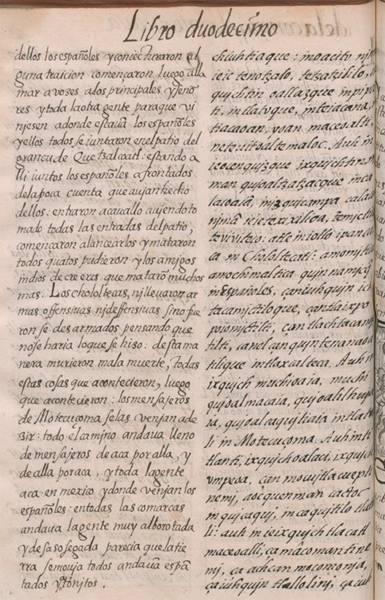 |
[Transcription of the Nahuatl (right-hand column) by James Lockhart:]
[f. 16v.] chiuhtiaque: in oacito nimā ie ic tenotzalo, tetzatzililo, ixquichtin oallazque in pipilti, in tlatoque, in teiacana, in tiacaoan, yoan maceoati, neteuitoaltemaloc. Auh in ie ocenquizque ixquichtin, niman quioaltzatzacque in calacoaiā, in izquicampa calacoa, nimā ie ic texixilioa, temictilo, teviviteco, atle iniollo ipan catca in Chololtecatl: amo mitica amo chimaltica quinnamicq¯ in Españoles, çan iuhquin ichtacamictiloque, çan tlaixpopoiomictilti, çan tlachtacamictilti, canel çan quintenanaoatilique in tlaxcalteca.
Auh in ixquich muchioaia, muchi quioalmacaia, quioalilhuiaia, quioalcaquitiaia in tlatolli in Motecuçoma. Auh in titlanti, ixquich oalaci, ixquich vmpeoa, çanmocuitlacueptinemi, aoc quenman cactoc in quicaqui, incaquitilo tlatolli: auh in ie ixquich tlacatl maceoalli, çamâcomantinemi, ça achcan mocomonia, ça iuhquin tlallolini, ça iuh
|
[Translation of the Nahuatl (right-hand column) by James Lockhart:]
When they arrived, there was a general summons and cry that all the noblemen, rulers, subordinate leaders, warriors, and commoners should come, and everyone assembled in the temple courtyard. When they had all come together, [the Spaniards and their friends] blocked the entrances, all the places where one entered. Thereupon people were stabbed, struck, and killed. No such thing was in the minds of the Cholulans; they did not meet the Spaniards with weapons of war. It just seemed that they were stealthily and treacherously killed, because the Tlaxcalans persuaded [the Spaniards] to do it.
And a report of everything that was happening was given and relayed to Moteucçoma. Some of the messengers would be arriving as others were leaving; they just turned around and ran back. There was no time when they weren’t listening, when reports weren’t being given. And all the common people went about in a state of excitement; there were frequent disturbances, as if the earth moved and <quaked>
[Translation of the Spanish (left-hand column) by James Lockhart:]
of them and conjectured some treason.
Then they began to cry out loudly to the leaders and lords and all the other people [of Cholula] to come to where the Spaniards were, and they all assembled in the square of the great cu [temple] of Quetzalcoatl. When they were together there, the Spaniards, affronted by the little notice they had taken of them, entered on horseback, having secured all the entrances to the square, and began to put them to the lance, killing as many as they could, and it is to be believed that the friendly Indians killed many more. The Cholulans bore neither offensive nor defensive weapons, but went unarmed, thinking that what was done would not be done, so that they died a bad death.
As soon as all these things happened, Moteucçoma's messengers came to tell him of them; the whole road was full of messengers from here to there and there to here, and all the people here in Mexico and in the districts where the Spaniards were coming went about very agitated and upset. It seemed that the earth moved; everyone went about shocked and stunned.
|
[Translation of the Nahuatl into Spanish by Fr. Bernardino de Sahagún; transcription of the Spanish (left-hand column) by James Lockhart:]
[f. 16v.] dellos los españoles y coniecturaron alguna traicion
començaron luego a llamar a vozes a los principales y señores y toda la otra gente para que viniesen a donde estauā los españoles y ellos todos se iuntaron en el patio del gran cu de Quetzalcoatl: estando alli iuntos los españoles afrontados de la poca cuenta que auian hecho dellos: entraron a cauallo auiendo tomado todas las entradas del patio, començaron a lancearlos y mataron todos quatos pudieron y los amigos indios de creer es que matarō muchos mas. Los chololtecas, ni lleuaron armas offensiuas ni deffensiuas sino fueronse desarmados pensando que no se haria lo que se hizo: desta manera murieron mala muerte,
todas estas cosas que acontecieron, luego que acontecieron: los mensajeros de Motecuçoma se las venian a dezir: todo el camino andaua lleno de mensajeros de aca por alla, y de alla por aca, y toda la gente aca en mexico y donde venian los españoles en todas las comarcas andaua la gente muy alborotada y desasosegada parecia que la tierra se mouia todos andauā espātados y atonitos.
|
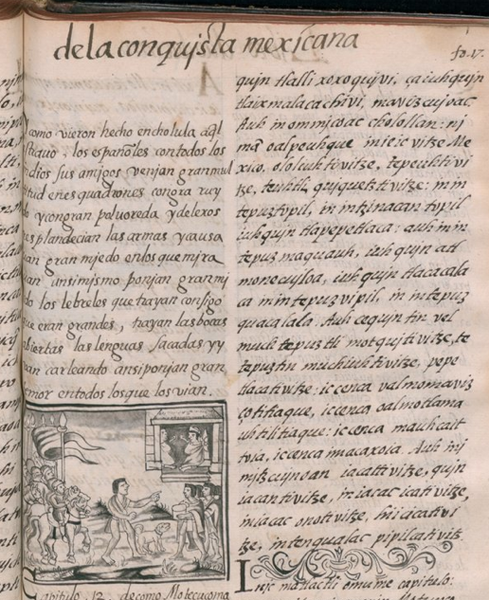 |
[Transcription of the Nahuatl (right-hand column) by James Lockhart:]
[f. 17r.] quin tlalli xoxoquivi,* ça iuhquin tlaixmalacachivi, mavizcuioac.
Auh in ommicoac cholollan: nimā oalpeuhque in ie ic vitze Mexico, ololiuhtivitze, tepeuhtivitze, teuhtli,quiquetztivitze, in intepuztopil, in intzinacantopil iuhquin tlapepetlaca: auh in intepuzmaquauh, iuhquin atl monecuiloa, iuhquin tlacacalaca in intepuzvipil, in intepuzquacalala. Auh cequintin vel much tepuztli mot-quitivitze, tetepuztin muchiuhtivitze, pepetlacaivitze: iccenca valmomavizçotitiaque, ic cenca oalmotlamauh-tilitiaque: ic cenca mauhcaittoia, ic cenca imacaxoia.Auh in imitzcuinoan iacattivitze, quiniacantivitze iniacac icativitze, iniacac onotivitze, hiicicativitze, intenqualac pipilcativitz.
----------
*XOXOQUIVI. I have not found a satisfactory analysis for this word and rely on the analogous preceding phrase.
|
[Translation of the Nahuatl (right-hand column) by James Lockhart:]
as if everything were spinning before one’s eyes. People took fright. And after the dying in Cholula, [the Spaniards] set off on their way to Mexico, coming gathered and bunched, raising dust. Their iron lances and halberds seemed to sparkle, and their iron swords were curved like a stream of water. Their cuirasses and iron helmets seemed to make a clattering sound. Some of them came wearing iron all over, turned into iron beings, gleaming,so that they aroused great fear and were generally seen with fear and dread. Their dogs came in front, coming ahead of them, keeping to the front, panting, with their spittle hanging down.
[Translation of the Spanish (left-hand column) by James Lockhart:]
After they had wrought that havoc in Cholula, the Spaniards with all their Indian friends came in a great multitude, in squadrons, with much noise and dust, and their weapons gleamed from a distance, arousing great fear in those who were looking. Likewise the greyhounds they brought with them inspired great dread, for they were large, with their mouths open and tongues hanging out, and they went along panting, and thus they inspired great fear in all who saw them.
|
[Translation of the Nahuatl into Spanish by Fr. Bernardino de Sahagún; transcription of the Spanish (left-hand column) by James Lockhart:]
[f. 17r.] Y como vieron* hecho en cholula aq̄l estrauo,** los españoles con todos los indios sus amigos venian gran multitud en esquadrones con gra ruydo y con gran poluoreda y de lexos resplandecian las armas y causauan gran miedo en los que mirauan ansimismo ponian gran miedo los lebreles que trayan consigo que eran grandes, trayan las bocas abiertas las lenguas sacadas y yvan carleando ansi ponian gran temor en todos los que os vian.
----------
*COMO VIERON. The second o in "como" serves twice, a second time in what must be read as "ovieren."
**ESTRAUO. For "estrago."
|

